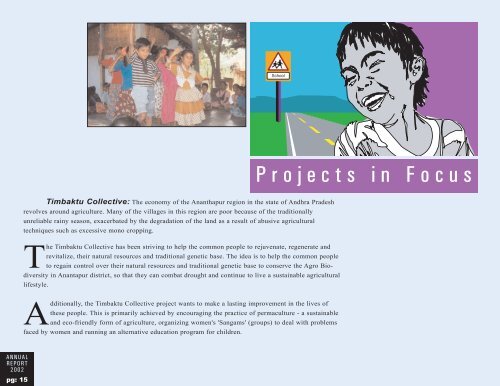ANNUAL REPORT 2002 - Asha for Education
ANNUAL REPORT 2002 - Asha for Education ANNUAL REPORT 2002 - Asha for Education
SchoolProjects in FocusTimbaktu Collective: The economy of the Ananthapur region in the state of Andhra Pradeshrevolves around agriculture. Many of the villages in this region are poor because of the traditionallyunreliable rainy season, exacerbated by the degradation of the land as a result of abusive agriculturaltechniques such as excessive mono cropping.The Timbaktu Collective has been striving to help the common people to rejuvenate, regenerate andrevitalize, their natural resources and traditional genetic base. The idea is to help the common peopleto regain control over their natural resources and traditional genetic base to conserve the Agro Biodiversityin Anantapur district, so that they can combat drought and continue to live a sustainable agriculturallifestyle.Additionally, the Timbaktu Collective project wants to make a lasting improvement in the lives ofthese people. This is primarily achieved by encouraging the practice of permaculture - a sustainableand eco-friendly form of agriculture, organizing women's 'Sangams' (groups) to deal with problemsfaced by women and running an alternative education program for children.ANNUALREPORT2002pg: 15
Gyanganga: Jherli is one of the most backward and underdeveloped GramPanchayats in the Jhunjhunu district of Rajasthan. Gyanganga initially started with improving theeducational environment in the primary school level for Jherli Panchayat consisting of threevillages namely Garinda, Railla & Jherli in Jhunjhunu district, Rajasthan. The total population ofthese villages is more than 5,000 and the basic occupations of the villagers are cultivation, dailywagelabor and small business.Projects in FocusThe National Service Scheme (NSS) unit ofBirla Institute of Technology and Science ispart of the National Service Schemeintroduced by the Indian Government in 1969. TheNSS team at BITS-Pilani has been working in nearbyvillages for quite some time. The schooling facility inJherli is up to 10th standard and in Raila and Garinda are up to 5th standard. The Government ofRajasthan runs all the schools. The number of school-going children in Jherli, Raila and Garindaare 273, 87 and 59 respectively. Almost fifty percent of them are girls.In addition to targeting the lowest literacy district, Gyanganga is also attempting to build acommunity based education model that could be sustained beyond the initial funding. Theexecution of the project involves working with the local community, panchayat and thegovernment school (and its teachers) to create an education environment that could be sustainedby the local people with the help from the government. The team is currently in dialogue withSchoolNet India to help us with their experience in developing and implementing a communitybased education model.ANNUALREPORT2002pg: 16
- Page 4 and 5: There has been a marked increase in
- Page 7 and 8: Asha raises funds for its projects
- Page 9 and 10: Afull expression of Pandey's vision
- Page 11 and 12: Asha has come a long way since the
- Page 13 and 14: Asha-Zurich was started in conjunct
- Page 15: Asha for education supports a large
- Page 19 and 20: Asha-India Conference: December 27-
- Page 21 and 22: Here are some of the other similarp
- Page 23 and 24: TeamAccomplishing a task like runni
- Page 25 and 26: Chapter-Wise Financial SummaryChapt
- Page 27 and 28: Consolidated Statement of IncomeFIN
- Page 29 and 30: Chapter-Wise Projects SupportSeattl
- Page 31 and 32: Appendices: USA Chapter ContactsAri
- Page 33: ANNUALREPORT2002w w w . a s h a n e
SchoolProjects in FocusTimbaktu Collective: The economy of the Ananthapur region in the state of Andhra Pradeshrevolves around agriculture. Many of the villages in this region are poor because of the traditionallyunreliable rainy season, exacerbated by the degradation of the land as a result of abusive agriculturaltechniques such as excessive mono cropping.The Timbaktu Collective has been striving to help the common people to rejuvenate, regenerate andrevitalize, their natural resources and traditional genetic base. The idea is to help the common peopleto regain control over their natural resources and traditional genetic base to conserve the Agro Biodiversityin Anantapur district, so that they can combat drought and continue to live a sustainable agriculturallifestyle.Additionally, the Timbaktu Collective project wants to make a lasting improvement in the lives ofthese people. This is primarily achieved by encouraging the practice of permaculture - a sustainableand eco-friendly <strong>for</strong>m of agriculture, organizing women's 'Sangams' (groups) to deal with problemsfaced by women and running an alternative education program <strong>for</strong> children.<strong>ANNUAL</strong><strong>REPORT</strong><strong>2002</strong>pg: 15



